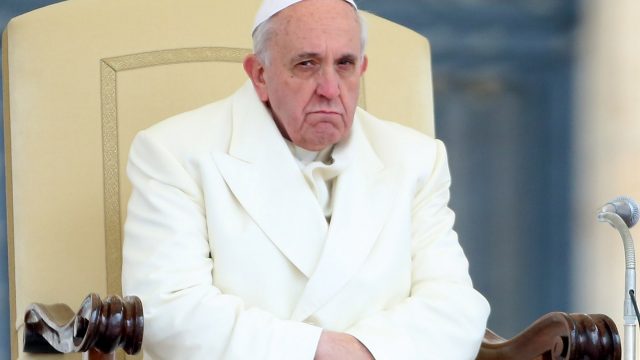Rod St. Aubyn: The Pope And The Separation Of Church And State

VATICAN CITY, VATICAN - JANUARY 29: Pope Francis holds his weekly audience in St. Peter's Square on January 29, 2014 in Vatican City, Vatican. After his appearance on the cover of Rolling Stone magazine, today Pontiff was also found to be represented in a graffiti in Rome that portrays him in a superhero vest. (Photo by Franco Origlia/Getty Images)
The media has been enamored with Pope Francis’s visit to the United States and in particular with his stops in Washington DC, New York, and Philadelphia. His every move has been closely watched and analyzed by the media and the public. Even though there are a lot of Roman Catholics in our country and the Vatican is considered its own sovereign nation, I pondered when we have had such an interest for a Head of State visit to the United States. China just completed a state visit as well. You saw very little press coverage with that visit.
Along with the Pope’s visit was great interest by politicians and the media for his speech before a joint session of Congress. Among the topics he discussed included:
- Support for immigration expansion
- Defend human life at every stage of development
- Abolish the death penalty
- Support for distribution of wealth
- Climate change
- Anti-war message and stopping arms trade
- The importance of family and the institution of marriage
Republicans picked up on the issues that most Republicans support such as the pro-life message and the importance of family and marriage. Even though the Pope did not specifically address the same sex marriage issue, some pundits inferred that the Pope was opposed. Others contradicted that analysis.
And the Democrats were pleased that he supported immigration expansion, abolishing the death penalty, distribution of wealth, his anti-war message, and the climate change issue.
As the politicians spun their own interpretations, I was struck by the often quoted phrase, “Separation of Church and State”, which was often recited by Democrats in opposing the actions by Kentucky Clerk, Kim Davis, who refused to sign marriage licenses for same sex marriages because of her religious beliefs. Same sex marriage was recently ruled constitutional by the Supreme Court. Immaterial if I am for or against same sex marriage, I personally thought that this contract was a state issue and that the Supreme Court overstepped their authority. If the term “Separation of Church and State” is applicable with the Kim Davis situation, why wouldn’t it also apply to having the head of the Catholic Church espousing the Church’s views on these issues before Congress? Should the head of other religions also have the opportunity to share their views before Congress?
Many people mistakenly believe that the term “Separation of Church and State” is in the constitution or in our Bill of Rights. However, it is commonly believed that that phrase originated by Thomas Jefferson. Jefferson wrote a letter in 1802 to the Danbury Baptist Association where he referenced the First Amendment. In that letter he stated the following:
“Believing with you that religion is a matter which lies solely between Man & his God, that he owes account to none other for his faith or his worship, that the legitimate powers of government reach actions only, & not opinions, I contemplate with sovereign reverence that act of the whole American people which declared that their legislature should ‘make no law respecting an establishment of religion, or prohibiting the free exercise thereof,’ thus building a wall of separation between Church and State.”
From that letter, many argue the term “Separation of Church and State” was born. Many of this country’s laws are based on morals taught by religions. The Pope does not represent all religions nor are Kim Davis’s religious convictions shared by all US citizens. The argument that “Separation of Church and State” prevents either from having and espousing those beliefs is wrong. Though I don’t agree with some of what the Pope stated, I am proud that such a person can freely speak about those beliefs without fears of being killed for having those beliefs. That is not true in many other countries.




